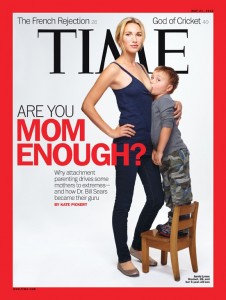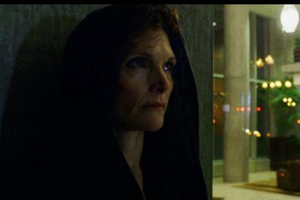Mom Enough?: The Return of the Absentee Mother as Threat
 [Note: The following post discusses the first season finales of Alias, Grimm, and Revenge, and thus contains spoilers for those episodes.]
[Note: The following post discusses the first season finales of Alias, Grimm, and Revenge, and thus contains spoilers for those episodes.]
There is an unwritten rule in dramatic television–particularly shows whose genres create unstable realities for the characters–that no one is really dead until you see a body. Through supernatural or soap operatic machinations, characters previously believed to be dead can act as a Chekhov’s gun waiting to go off, upending a protagonist’s worldview and often destabilizing their essential sense of self.
Ten years ago, Alias pulled the trigger on that narrative gun by ending its first season with a shadowy figure in a doorway and a handcuffed and beaten Sydney Bristow looking to her captor and asking, “Mom?” Audience members had known that Sydney’s supposedly dead mother, Irina Derevko, was a Soviet spy and potentially very much alive, but the final moments of the season revealed her as a direct and ongoing threat to Sydney. She was “The Man,” the season’s big bad. The question of “Mom?” mixed hope and terror as the revivification of the maternal is wrapped in violence, a threat left unclear over the four-month summer hiatus.
Now, almost ten years later, two more first seasons of television ended with similar revelations: NBC’s Grimm and ABC’s Revenge. All three shows are set in narrative worlds where twists, threats, and threatening twists are commonplace, relating to ongoing serial mysteries and generic conventions. There is nothing necessarily new about a character’s surprising return, but the particular attention to the absent mother’s return in a threatening form that appeared in two finales last week appears to tap into a current and contentious discourse of motherhood: attachment parenting.
This recent TIME Magazine cover image and the accompanying story discuss attachment parenting as both physical and emotional closeness between mother and child during the child’s formative years. The image on the cover represents an extreme example of that method in which a child is breastfeeding well past the normative time-frame. Underlying this form of parenting is a reaction against absentee-ism and an implicit critique of distance between mother and child. It is this criticism that links with the threatening fictional mothers on Alias, Grimm, and Revenge. Death appears to be the only legitimate reason for an absent mother, and when that death is revealed as a lie, the mother becomes a threat to the child.
 Grimm’s first season finale, “The Woman in Black,” followed protagonist detective and creature-hunting Grimm, Nick Burkhardt, as he is threatened by a man who was involved in his parents’ murder. The eponymous woman operates one step ahead of Nick, the police, and the assassin, outwitting, outrunning, and outfighting all before revealing her identity as Nick’s supposedly dead mother. Although the reveal tempers her threatening characteristics–at least toward Nick–the majority of the episode portrays her as a powerful, shadowy figure not to be trusted. She poses a potential physical threat toward Nick by being a clearly better fighter than him (in a few seconds she fells the man he had battled for the previous five minutes), but she also represents a threat to his understanding of self and purpose. If his parents–particularly his mother through whose blood the gift/duty of being a Grimm was passed to him–were not sacrifices to the Grimm duty and name but were/are instead hiding from it or waging their own separate war, how can Nick reconcile his recent acceptance of the mantle? It is yet unclear whether Nick’s mother will live up to her threatening title as the Woman in Black and join the other monstrous women of the show or if the reference to Susan Hill’s recently adapted novel is merely happenstance. The implication, however, seems to be that there is something seriously wrong with her that she’d distance herself from her son when he was a child.
Grimm’s first season finale, “The Woman in Black,” followed protagonist detective and creature-hunting Grimm, Nick Burkhardt, as he is threatened by a man who was involved in his parents’ murder. The eponymous woman operates one step ahead of Nick, the police, and the assassin, outwitting, outrunning, and outfighting all before revealing her identity as Nick’s supposedly dead mother. Although the reveal tempers her threatening characteristics–at least toward Nick–the majority of the episode portrays her as a powerful, shadowy figure not to be trusted. She poses a potential physical threat toward Nick by being a clearly better fighter than him (in a few seconds she fells the man he had battled for the previous five minutes), but she also represents a threat to his understanding of self and purpose. If his parents–particularly his mother through whose blood the gift/duty of being a Grimm was passed to him–were not sacrifices to the Grimm duty and name but were/are instead hiding from it or waging their own separate war, how can Nick reconcile his recent acceptance of the mantle? It is yet unclear whether Nick’s mother will live up to her threatening title as the Woman in Black and join the other monstrous women of the show or if the reference to Susan Hill’s recently adapted novel is merely happenstance. The implication, however, seems to be that there is something seriously wrong with her that she’d distance herself from her son when he was a child.
Different from the two mothers discussed above, the reveal that Amanda Clark’s mother may still be alive on Revenge does not pose a physical or immediate threat to her daughter, but it does show a similar potential for existential crisis. What happens to Amanda’s singularly focused drive for revenge when she may have family yet to love and lose? Alternatively, what role might Mrs. Clark play in the vast conspiracy that instigated Amanda’s vengeance? Might she be “the Man” behind the Initiative? How bad could she have been to warrant a faked death and total isolation from her young daughter? We are only told that there is more to Mrs. Clark’s alleged death than we know, and that David Clark didn’t even bring a picture of his allegedly dead wife when he moved to the Hamptons. Until next season, she is an empty vessel for viewer supposition, the equivalent of a shadow in a doorway, a maternal threat cultivated through absence, a bomb waiting to go off.



Each of the two current series created a modestly important character that shifts from a clearly victimized mother to one that abandoned her child. Grimm did approach this shift more elegantly than Revenge I feel, for it allowed the death of the mother to be deeply intertwined with the main character over a longer set of episodes.
There is some fascination with both shows’ decision to have a ‘prodigal’ mother (possibly) return, but Revenge’s possible danger of a woman thought dead, without ever knowing who to blame for, or why to care about said death poses a dilemma of sorts. It feels like the deus-ex-machina has ascended, and unnecessarily so. After all the rabbit hole has just deepened enough to provide a few magnificent seasons to come, and then there is the problem of Fauxmanda and Jack to deal with. At this point I hope that this is a side plot set up to allow Ems/Emanda/Emily to go on another hunt should there be a season three. Too many narrative threats would, I fear, dilute this very volatile balance of noir, soap, and classic revenge narrative a la Dumas.
But I digress; this is a very interesting piece you wrote that makes me wonder how much motherhood (see also Grimm and the Monstrous Feminine) and postfeminism come into play in this? How does the image of motherhood intersect with that of feminism? They often seem to be oddly removed from one another. I am wondering how this may also counteract or speak to a time where teen pregnancy shows flood the plains of reality TV programming, where mothers are seen spoiling and pushing their children, and women still negotiate their position in society. In regards to Revenge I found Anne Helen’s piece Revenge a Postfeminist Dystopia quite interesting also.